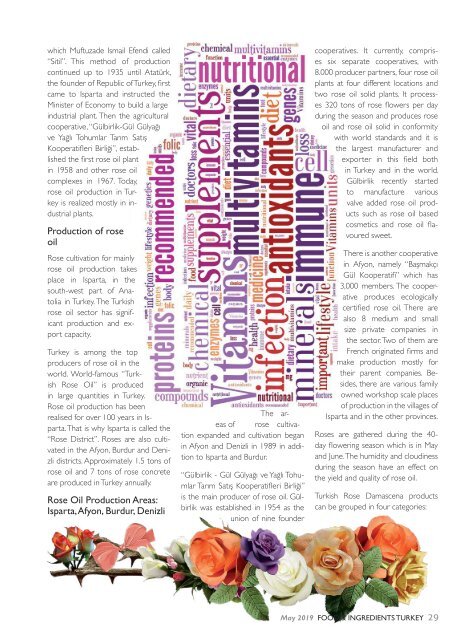Food Turkey Magazine May 2019
Food Turkey Magazine May 2019
Food Turkey Magazine May 2019
You also want an ePaper? Increase the reach of your titles
YUMPU automatically turns print PDFs into web optimized ePapers that Google loves.
which Muftuzade Ismail Efendi called<br />
“Sitil”. This method of production<br />
continued up to 1935 until Atatürk,<br />
the founder of Republic of <strong>Turkey</strong>, first<br />
came to Isparta and instructed the<br />
Minister of Economy to build a large<br />
industrial plant. Then the agricultural<br />
cooperative, “Gülbirlik-Gül Gülyağı<br />
ve Yağlı Tohumlar Tarım Satış<br />
Kooperatifleri Birliği”, established<br />
the first rose oil plant<br />
in 1958 and other rose oil<br />
complexes in 1967. Today,<br />
rose oil production in <strong>Turkey</strong><br />
is realized mostly in industrial<br />
plants.<br />
Production of rose<br />
oil<br />
Rose cultivation for mainly<br />
rose oil production takes<br />
place in Isparta, in the<br />
south-west part of Anatolia<br />
in <strong>Turkey</strong>. The Turkish<br />
rose oil sector has significant<br />
production and export<br />
capacity.<br />
<strong>Turkey</strong> is among the top<br />
producers of rose oil in the<br />
world. World-famous “Turkish<br />
Rose Oil” is produced<br />
in large quantities in <strong>Turkey</strong>.<br />
Rose oil production has been<br />
realised for over 100 years in Isparta.<br />
That is why Isparta is called the<br />
“Rose District”. Roses are also cultivated<br />
in the Afyon, Burdur and Denizli<br />
districts. Approximately 1.5 tons of<br />
rose oil and 7 tons of rose concrete<br />
are produced in <strong>Turkey</strong> annually.<br />
Rose Oil Production Areas:<br />
Isparta, Afyon, Burdur, Denizli<br />
The areas<br />
of rose cultivation<br />
expanded and cultivation began<br />
in Afyon and Denizli in 1989 in addition<br />
to Isparta and Burdur.<br />
“Gülbirlik - Gül Gülyağı ve Yağlı Tohumlar<br />
Tarım Satış Kooperatifleri Birliği”<br />
is the main producer of rose oil. Gülbirlik<br />
was established in 1954 as the<br />
union of nine founder<br />
cooperatives. It currently, comprises<br />
six separate cooperatives, with<br />
8.000 producer partners, four rose oil<br />
plants at four different locations and<br />
two rose oil solid plants. It processes<br />
320 tons of rose flowers per day<br />
during the season and produces rose<br />
oil and rose oil solid in conformity<br />
with world standards and it is<br />
the largest manufacturer and<br />
exporter in this field both<br />
in <strong>Turkey</strong> and in the world.<br />
Gülbirlik recently started<br />
to manufacture various<br />
valve added rose oil products<br />
such as rose oil based<br />
cosmetics and rose oil flavoured<br />
sweet.<br />
There is another cooperative<br />
in Afyon, namely “Başmakçı<br />
Gül Kooperatifi” which has<br />
3,000 members. The cooperative<br />
produces ecologically<br />
certified rose oil. There are<br />
also 8 medium and small<br />
size private companies in<br />
the sector. Two of them are<br />
French originated firms and<br />
make production mostly for<br />
their parent companies. Besides,<br />
there are various family<br />
owned workshop scale places<br />
of production in the villages of<br />
Isparta and in the other provinces.<br />
Roses are gathered during the 40-<br />
day flowering season which is in <strong>May</strong><br />
and June. The humidity and cloudiness<br />
during the season have an effect on<br />
the yield and quality of rose oil.<br />
Turkish Rose Damascena products<br />
can be grouped in four categories:<br />
<strong>May</strong> <strong>2019</strong> <strong>Food</strong> & Ingredients TURKEY 29

















